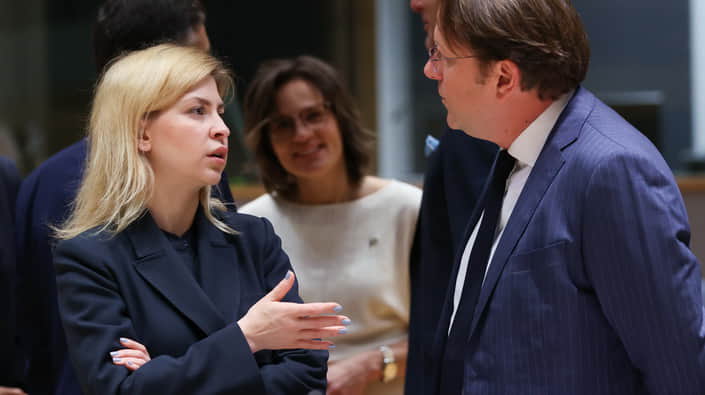Deputy PM in Charge of EU: Ukraine Is an Enlargement Leader. We’ll Do the Impossible during Accession Negotiations

In less than two weeks, Ukraine will be marking another anniversary of the Revolution of Dignity. Ten years ago, we took to the main square of Kyiv to defend our European future.
Back then, achieving candidate status for Ukraine, let alone a recommendation from the European Commission to start accession negotiations, seemed almost unreal.
Today there is absolutely no doubt that Ukraine is a future EU member.
Furthermore, we are progressing faster than any other candidate country in the past decade.
And the European Commission report recommending that EU accession negotiations be opened confirms that our progress is the result of significant work done by Ukraine.
It’s important to put emotions aside and understand what is written in the EU Enlargement Package published today, in which Ukraine is represented for the first time, and what lies ahead for us.
A great success in adverse conditions
We know how to achieve the goals set by Ukrainians and confidently move forward, despite certain politicians who more often hinder than help.
All the tasks agreed upon between Ukraine and the European Commission have been implemented. And the decision to grant Ukraine candidate status has been a catalyst for further democratic transformations in the country.
As well as carrying out these tasks, Ukraine has taken additional steps, such as the reinstatement of open e-declarations. Significant attention has also been paid to systemic measures aimed at de-oligarchisation. These were additional steps, but they have been crucial for the reforms themselves and the overall assessment.
Moreover, we will continue to insist on a clearer application of the merit-based approach, based on what the candidate country has achieved. It has sometimes seemed as if the bar was continually being raised for us to "align" our results with those of other candidates so that Ukraine's achievements would not appear too high. This is incorrect. Ukraine's progress cannot be evaluated based on how other countries are progressing towards membership.
While the EU Enlargement Package was being prepared, Ukraine provided regular updates on progress, not only regarding the implementation of the European Commission's recommendations, but also across all aspects of the future negotiations.
This extensive document, over 150 pages long, provides a detailed understanding of our country's development. While we may disagree with some of the conclusions and will discuss others, overall it is an extremely valuable snapshot.
We need to keep moving forward regardless of the circumstances.
As a country at war, we demonstrated in just 18 months that we are ready to engage in EU accession negotiations. Neither Russia's constant missile terror nor the horrors of full-scale war have slowed us down—in fact, quite the opposite.
We’ve proven that when we are united and focused, we can achieve the impossible.
I firmly believe that the speed of our progress towards EU membership will continue to depend significantly on our readiness to shed our inferiority complex and believe in ourselves.
Next steps for Ukraine and the EU
The political decision to start negotiations may be made at the EU leaders' summit on 14-15 December.
Ukraine already has a positive assessment from the European Commission and a recommendation on starting negotiations. There are no technical constraints preventing the European Council from making this decision.
However, it's important to remember that there is a rule of consensus among the 27 EU member states.
Clearly, for most countries, the European Commission’s recommendation will be the basis for making the political decision. To secure the support of all member states this year, we will be engaging in bilateral communication and advocacy efforts with certain countries.
And specifically for the sceptics, I would like to mention that our strong position on all seven recommendations is a powerful argument.
What happens next?
The European Commission's enlargement report includes certain expectations—steps to be taken before the next stage: approval of the framework for EU-Ukraine negotiations.
These steps involve implementing several legislative measures, such as increasing staffing for the National Anti-Corruption Bureau (NACB), expanding the powers of the National Agency for the Prevention of Corruption (NAPC) with regard to the verification of assets, bringing lobbying regulations into line with European standards, and complying with the Venice Commission’s recommendations regarding national minorities.
Some draft laws on these issues have already been registered with the Verkhovna Rada (Ukraine's parliament). We are ready to meet these requirements, even though they were introduced as additional measures only a few months ago.
We are moving forward on schedule.
Our aim is to hold the first Intergovernmental Conference on membership in March 2024.
The process of systemic transformations is ongoing, as is thorough preparation for the negotiations.
We have conducted self-screening of legislation. That means this stage will not take years, as it has in other countries.
We are giving Ukrainian businesses an opportunity to consider and prepare for the future right now, and to formulate their positions, which will allow for the swift development of the country's overall negotiating position.
Based on our self-assessment, we are now preparing a National Programme for the Adaptation of Legislation to EU Law (the EU acquis), into which we will also integrate the conclusions from the European Commission's report.
* * * * *
On 8 November, Ukraine confirmed its status as a leader in the enlargement process.
We have essentially created a fast-track procedure for EU accession called the Ukrainian Path.
This does not mean that Ukraine is demanding any rebates or special treatment, particularly due to the war. We are moving forward following all the procedures provided by EU rules, but we are determining the speed, pace and dynamics ourselves.
This is evident from the decisions being made today and the next steps that have already been prepared.
We are doing everything we need to do to maintain a rapid pace of transformation and move towards full EU membership.
